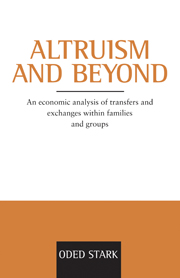Book contents
- Frontmatter
- Contents
- Preface
- Introduction
- 1 Altruism, transfers, and wellbeing
- 2 The timing of intergenerational transfers: an implication
- 3 An exchange implication of transfers: the demonstration effect
- 4 Transfers by migrants: a strategic motive for remittances
- 5 Exchange with recognition costs: an explanation of migrants' performance
- 6 Intrafamilial transfers and exchanges: forming and sustaining altruism
- Index
1 - Altruism, transfers, and wellbeing
Published online by Cambridge University Press: 23 September 2009
- Frontmatter
- Contents
- Preface
- Introduction
- 1 Altruism, transfers, and wellbeing
- 2 The timing of intergenerational transfers: an implication
- 3 An exchange implication of transfers: the demonstration effect
- 4 Transfers by migrants: a strategic motive for remittances
- 5 Exchange with recognition costs: an explanation of migrants' performance
- 6 Intrafamilial transfers and exchanges: forming and sustaining altruism
- Index
Summary
Introduction
In all economies, but particularly in less developed countries, a considerable proportion of resource transfers takes place outside the realm of the marketplace: inside families, within households, and among members of kin group or caste. Often it is not all that clear what exactly these transfers “buy”: we do not see commodities moving in the reverse direction nor do we observe a flow of easily definable services. For example, households in rural India “purchase” insurance against variability in consumption not from insurance companies but from other households whose sons marry their daughters, and whose incomes exhibit low covariability with their own (Rosenzweig and Stark [1989]). Such actions are different from typical marketplace exchanges where the transfer of a commodity from A to B is accompanied by the transfer of another commodity from B to A and where one of the exchangeables is money, so that it is quite clear what is being bought – and at what price. It is generally argued that nonmarket intragroup transfers are mandated by the insufficient development of markets and that as development proceeds, a larger share of transfers and exchanges is relegated to the marketplace. This reassignment is believed to hasten the pace of economic development as the scope for exchange and trading opportunities increases. This, in turn, should feed back into the production opportunities set by facilitating increased specialization and recourse to comparative advantage.
The precise mechanisms that generate nonmarket transfers have not so far been well explored.
- Type
- Chapter
- Information
- Altruism and BeyondAn Economic Analysis of Transfers and Exchanges within Families and Groups, pp. 11 - 30Publisher: Cambridge University PressPrint publication year: 1995
- 1
- Cited by

